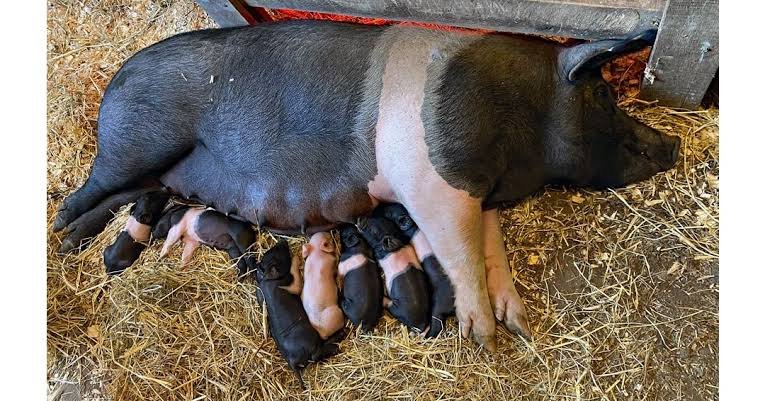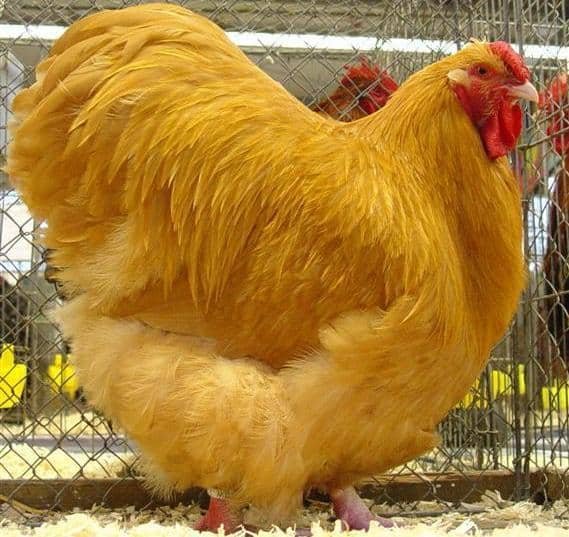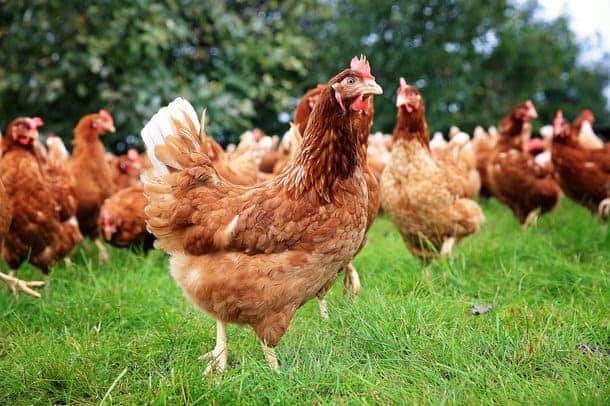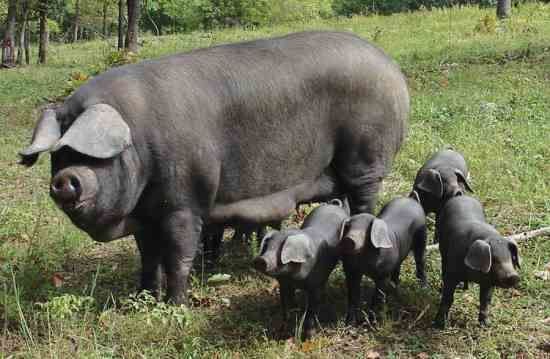Hampshire Pig Breed: Characteristics, Origin, and Lifespan

Are you considering getting some Hampshire pig breeds for your farm?
If that is the case, then you’ve got to read this guide to know their origin, characteristics, and whether they are the best breed for your farm.
We have a similar article like this one for the Duroc pig breed and for the Landrace pig breed.
You should definitely check those articles too.
Reading all through will give you options to select from.
In this article, the focus is on the Hampshire pig breed.
You will learn about the characteristics of this pig breed and what makes it so special.
If you are ready for this information, then let’s dive right in.
What is a Hampshire pig?
As much as pigs are known for fatty meat, Hampshire is a rare type that produces leaner meats.
They are docile and also friendly.
Birthing, nursing or weaning are easily carried out because its female pigs or sows produce healthy piglets.

What is the origin of the Hampshire pig breed?
Hampshire pigs have their origin in areas around Northern England and Scotland in the 18th and 19th centuries.
It was named after a state in the United Kingdom, Hampshire.
They are sometimes locally called Hampshire hogs.
In the 1830s, the Hampshire breed was introduced in the United States where it later developed and became common.
Since that time, many of the pigs have been altered.
The new breed from this alteration is now known as Wessex Saddleback pigs.
The main difference between these altered breeds and the original breed is their floppy ears and preference for forest foraging rather than being farm animals.
Why choose Hampshire pigs?
1. They produce lean meat:
Hampshire pigs are known for excellent lean meat, unlike other breeds that produce fatty meat.
2. They are easily reared and highly profitable:
Looking for a pig breed that is less stressful to rear with high productivity?
Then Hampshire is a breed that will provide you with what you asked for.
3. They produce large quantities of meat:
Hampshire pigs are capable of producing excessive meat that is good enough to feed a whole family for a long time especially when they are utilized properly.
4. They produce healthy piglets:
Unlike other breeds, Hampshire’s sows produce piglets that require less nurturing because they are born healthy.
This makes them very good breeds for your pig farming business.
What are the characteristics of rearing Hampshire pigs?
Hampshire swine are amazing creatures with characteristics that range from their physical nature to their intrinsic nature.
Below are some features which may help you identify a Hampshire pig in the wild.
Let’s start with its physical nature…

What are the physical characteristics of Hampshire pigs?
1. Head:
Hampshire pigs commonly have medium-sized heads that appear straight up and slim when observed from a specific angle.
Their eyes are usually small and it gives them limited vision.
2. Ears:
While other breeds may have floppy ears, Hampshire is a rare type that has its ears sticking straight up.
3. Teeth:
Hampshire pig’s teeth, though not sharp but can bite really hard onto food.
4. Tail:
Hampshire pigs’ tails are usually short and curly.
Its main purpose is to reach areas that the legs cannot reach.
5. Tusks:
Hampshire pig breed like other pigs naturally has tusks.
There is no exception to which is a male or female, domestic or wild.
The female tusks are usually short and they rarely grow long or they grow large enough to stick out of their mouths.
This trait helps one to easily identify the gender of the pigs in the wild.
6. Nails and hooves:
The Hampshire pigs also have hooves and nails as one of their features.
The Hampshire pigs that are reared for the domestic purpose may require more trimming of nails whereas the outdoor pigs that have a stable and solid footing may only require lesser trimming sessions.
7. Snout:
Hampshire pigs have small to medium-sized noses that are also upturned.
Pigs naturally are born with an excellent sense of smell which is why their snouts can be quite sensitive to touch.
8. Colour:
Hampshire pigs have very unique coloring.
While their bodies are almost all black, a belt exists around their middle that covers their front legs down to their hooves.
The belt is most likely white or ginger colored depending on which breed they were crossbred with.
9. Weight:
Hampshire pigs are average-sized pigs but to an average person, they might seem larger in size.
These breeds are quite large when it comes to weight measurements.
The boars can weigh up to 650 pounds while the sows can get up to 550 pounds on the scale.
What are the intrinsic characteristics of Hampshire pigs?
1. Behavior:
By behavior, Hampshire pigs are really considerate.
You can expect to see a Hampshire being emotional.
They can sense both the negative and positive emotions of a person.
If you are having a bad day, don’t be surprised if a Hampshire detects it and tries to offer a few nudges and snorts to show they are aware and as much try to comfort you too.
Because of their emotional attitude, you may want to treat these pigs with respect. Though they may not complain when being mistreated but they certainly will remember it.
2. Temperament:
Hampshire pigs are good-tempered breeds and they have an even disposition toward things.
They are friendly creatures that can adapt to any environment.
The only exception is that adult boars can become aggressive when they reach old age.
But naturally, they won’t attack if unprovoked.
What is the lifespan of Hampshire pigs?
Hampshire pigs can live for as long as 12 years.
However, most of the pigs are being slaughtered for meat purposes, especially the boars.
What are the habitat and environment for Hampshire pigs?
They are animals without restricted movement.
They are environment friendly, this is because they can adapt to any weather conditions, but they will do better in a clean environment.
Hampshire pigs will live in an environment that provides good enough space.
Also, there must be access to healthy foods and clean water.
Comfortable housing will protect the pigs from extreme weather conditions that would affect them negatively.
What space requirements are for Hampshire pigs?
Hampshire pigs, like every other pig breed, love to live in a wide space.
This will allow them to socialize evenly among themselves.
It’s not like they can’t stay in a small spaced area, but it would affect their social life and they won’t be comfortable staying there.
Thus, your pig will need enough space to socialize, eat and even exercise.
Don’t forget to separate young pigs from mature ones.
It is an essential feature in piggery maintenance and it also helps you to maintain orderliness.
What are the advantages of rearing Hampshire pigs?
1. They produce good meat:
Hampshire is known to have a well-muscled body and also for exhibiting good carcass quality when used as meat animals.
2. They are friendly creatures:
Hampshire pigs can become docile at times. They are good-tempered breeds and as such can be used as domestic pets.
3. They are good breeders:
Hampshire pigs are noted for their high breeding abilities.
The sows of these breeds have been praised for their capacity as mothers having extra longevity in nursing their young ones.
4. They are clean animals:
Unlike what we originally thought of pigs, Hampshire is clean and prefers to keep their living area clean.
They can go to the extent of assigning a spot in the piggery where they can excrete to avoid soiling their living space.
What are the disadvantages of rearing Hampshire pigs?
1. They need enough space:
Although other animals may endure staying in a small-spaced area, Hampshire pigs cannot tolerate being kept in one spot.
They can get as bored as trying to break through obstacles just to get to freedom.
As a result of Hampshire pigs being quite sensitive, they can get lonely and depressed.
2. They are rare breeds:
Hampshire pigs are heritage pigs and as such, very hard to find.
So, if you are rearing this pig on your farm, you will make a lot of money because of its scarcity.
3. They gallivant a lot:
Hampshire pigs like to move freely and wander around because they are curious sometimes and can even get sunburned in extremely hot conditions.
4. They can get spoiled and also stubborn:
Hampshire pigs have a wide range of emotions.
As a result, having a bad side should not be something that will awe you.
They can get stubborn when spoiled and become aggressive and destructive too.
The destructive nature found in the adult Hampshire pigs can be a sign of stress. When you notice your pig behaving deeply negatively, it is advised that you get them checked as it could be a way of expressing internal pain which we don’t usually notice until it gets worse.
Frequently asked questions about Hampshire pigs.
Here are some frequently asked questions about the Hampshire pig breed.
How many piglets can a Hampshire pig have?
Hampshire pigs can birth a lot of litters due to their capacity as mothers.
A sow can carry about 12 to 13 piglets in one pregnancy
Are Hampshire pigs aggressive?
Hampshire pigs are very friendly with the environment and cannot get aggressive easily.
A Hampshire can only get aggressive when it’s stressed but it can not go out of control.
That means it cannot become too aggressive and destructive.
This attitude is commonly found in adult boars.
Conclusion
Hampshire pigs are quite unique when it comes to their characteristics.
They produce lean meat unlike other breeds and are very sensitive to both negative and positive behaviors.
So, if you are considering getting the Hampshire pig breed for your farm, then you may be making the right decision.
Please, share this article with other farmers to help them make the right decision about this pig breed.
Read about other Pig breeds:
- Tamworth Pig breed- Characteristics, Origin, Breed info, and Lifespan
- All About The Vietnamese Pot-bellied pig breed
- Kunekune Pig: Characteristics, Origin, Breed Info, and Lifespan
- Berkshire Pigs: Characteristics, Origin, Breed Info, and Lifespan
- Yorkshire Pig: Characteristics, Origin, Breed Info, and Lifespan





